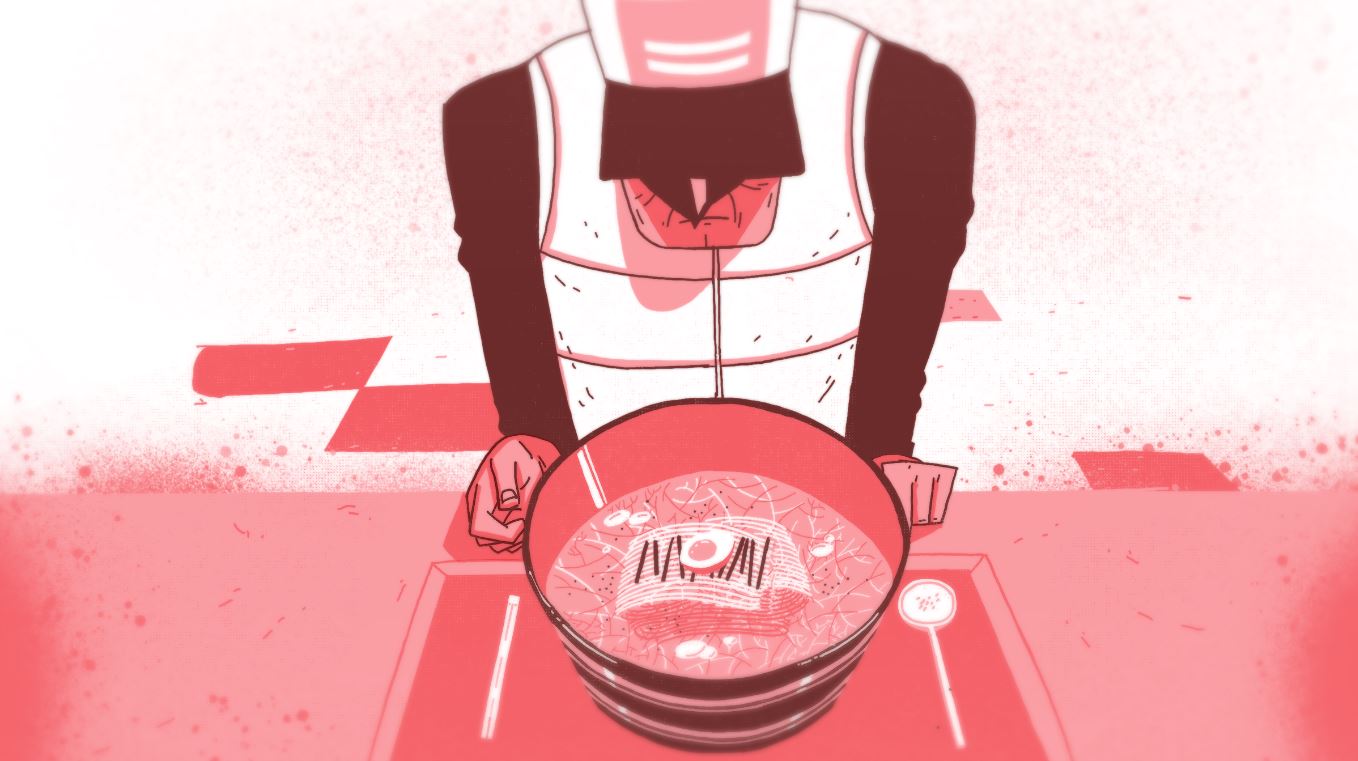A simple bowl of ramen noodles — a Japanese delicacy, with a salty broth matched with toppings of seaweed, egg, seafood or meat — gets an animated and politicized do-over by Canadian filmmaker Howie Shia.
Marco’s Oriental Noodles packs layers into its three minutes. It launched online November 27 as part of the CBC’s Keep Calm and Decolonize program curated by Jesse Wente. Five Canadian filmmakers — including the award-winning Indigenous documentarian Alanis Obamsawin and LGTBQ activist-director John Greyson — are asked to respond to Buffy Sainte-Marie’s call (in the title) as the country marks 150 years of Confederation. All five films were posted on launch day.
Shia, who runs the PPF production company with his two brothers, is well-known for doing commercial work but has been crafting more artistic work in the last decade, evidenced by his acclaimed animation Flutter at the 2015 Toronto International Film Festival.
In Marco’s Oriental Noodles, a person enjoying a bowl of ramen in the fictional town of Longbrook, Sask. (Shia grew up in Saskatoon), in the year 2037 discovers his fave noodle shop has decided to flow with the times by introducing psychedelic drugs into its broth.
I caught up with Shia who spoke from Toronto where he has lived for some time.
Question: Why did you chose ramen noodles to go with the theme of this project?
Howie Shia: I was talking to Jesse about colonization and decolonization, and I was apprehensive because I wasn’t sure I had a specific point of view on the legacy of colonization that went beyond the surface.
Then, I had this image of someone eating ramen, it popped into my head. I got the sense appropriation was big in Canadian identity. It’s this instinct a lot of us have had watching the rise of food culture over the last 10 years, especially in Toronto, and for me, having spent much time in Brooklyn.
I get the sense the cultural elite, you know the left-leaning, creative-arts people who consider themselves progressive, take appropriation seriously but always gave food culture a pass. I realized I could delve into this.
There’s this notion about the pursuit of authenticity in ethnic cuisine that’s held in academic/intellectual light. It could be argued, it’s a way of holding a culture in place. It’s kind of a colonial attitude, we have it now and we deserve to have it preserved as opposed to it being an evolutionary thing.
Who has a right to authentic cuisine? And there’s this thing, every small town in North America, there is a Chinese restaurant. These days it’s an Asian restaurant. It’s everywhere.
Q: So multiculturalism and globalism, how do they intersect with colonialism in your piece?
HS: Looking at the lead character — he was at one point considered progressive, he was pursuing multiculturalism actively and now he’s lost control of what that is. Now it’s something intimidating and bizarre to him.
There’s the notion of somebody adhering to something ethnically authentic as an act of cosmopolitanism, and lamenting the inevitable evolution of something at that at one point was “authentic” — but was it?
What is the difference between a trend, an import, (and) something that is a genuine consequence of immigration? There’s a weird hierarchy in food culture. Chinese food in Chinatown is real but if a Chinese restaurant was opened somewhere else and the bathrooms were magically clean there’s something inauthentic about it. Who gets to say what is genuine or not?
I don’t absolve myself of that judgment either. It’s in all of us.
Q: Your parents are Taiwanese and they settled in Canada in the ’70s. growing up, did you have a sense of colonization and its oppressive consequences?
HS: [Taking part in this project,] I was concerned that I had a view of being colonizer, being an immigrant. Growing up in Saskatoon, there’s this weird sense of progressive push for multiculturalism. You know, the high ideal of being Canadian. But that’s also the way First Nations was always kept separate from notion of multiculturalism.
As a kid, I didn’t recognize it, but it was back when [I went to the University of Toronto in the mid-90s] I started to think about it.
In Toronto at the time, First Nations were not very visible — especially in the downtown area. I did see them a lot in Saskatchewan growing up. So, I started recognizing how differently those communities were treated in Toronto and in Saskatoon. Nobody made Chinese jokes to me but they would make First Nations jokes. There was a lexicon of racist First Nations jokes. At the time as a kid, I thought it had to do with economic disparity.
And with this multiculturalism — I was lucky that I didn’t experience a lot of racism as a kid but it was very different for First Nations people.
Q: What are you hoping audiences get from your film?
HS: I don’t have any control over that so I’m hoping people walk away with it wondering about it, like what happened? but in a good way.
It’s like a great song, you never quite get to the bottom of it, or even a good poem. You never understand it fully including the people who made it!
The questions I’m dealing with are about appropriation and colonization. If [the audience] gets that, great but if they see some people eating weird ramen and that’s it, fine.
I hope it sparks curiosity and that they had an authentically rich, emotional experience watching it.
For more information on Keep Calm and Decolonize, click here.
Image: cbc.ca-mediacentre
Like this video? rabble is reader-supported journalism.




